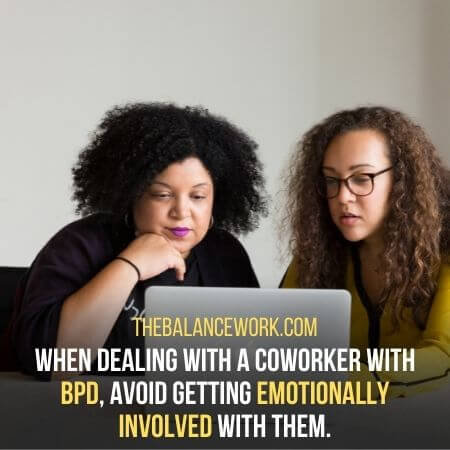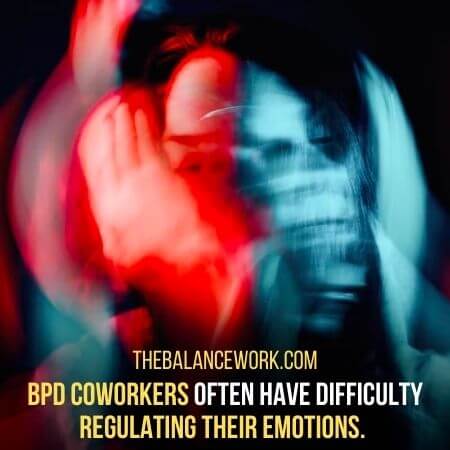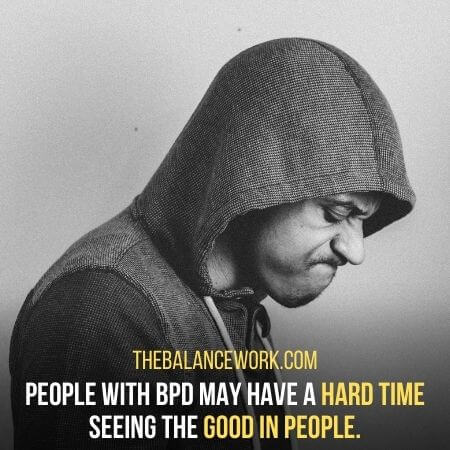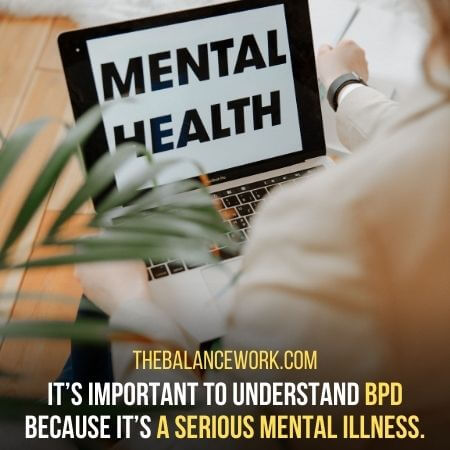How to deal with a coworker with borderline personality disorder (BPD) is a challenging domain? BPD often have difficulty controlling their emotions, and they may act out disruptive.
Keeping the peace can be challenging when you share close quarters with someone with borderline personality disorder (BPD).
8 Ways To Deal With A Coworker With Borderline Personality Disorder (BPD)
If you have a coworker with BPD, you may walk on eggshells to avoid conflict.
BPD often manifests as emotional instability and impulsive behavior. It also includes tumultuous relationships.
While it can be challenging to deal with a coworker with BPD, there are some strategies you can use.
Minimize friction and create a more productive work environment by the following steps:
1. Set Boundaries With Coworker:
It’s essential to establish boundaries with someone who has BPD. Let them know what behavior is acceptable and what is not.
You might need to be direct in your communication and avoid sugar-coating things. It’s also essential to stick to your boundaries.

If you give in to someone with BPD, they may view it as a sign of weakness and take advantage of you.
If they start to act out, you need to be firm in your resolve. Do not engage in any arguments or power struggles.
2. Keep Communication Open:
Open communication is critical in any relationship. It’s essential when dealing with someone with BPD.
Let them know if their behavior is affecting you. This can be a difficult conversation, but it’s essential to express how you feel.
Try to avoid any communication that could be misinterpreted. That means being clear, concise, and direct in your language.
Try to avoid any judgmental or accusatory language. Instead, focus on “I” statements that express how their behavior makes you feel.
For example, “I feel disrespected when you talk to me that way.”
It’s also important to keep an open mind when listening to someone with BPD.
They may see things differently than you do. Therefore, it’s essential to try to understand their perspective.
3. Seek Help From A Manager:
If you’re struggling to deal with a BPD coworker, seek help from a manager or HR representative.
They may be able to guide how to handle the situation best.
They can also talk to an individual with BPD about their behavior and its impact on the workplace.
For instance:
“I’ve noticed that you’ve been having a lot of outbursts lately. Can we talk about what’s going on?”
“I’m getting reports that you’re not following the company’s attendance policy. What’s going on?”
“I’ve gotten complaints that you’re being verbally abusive to your coworkers. Let’s talk about what’s going on.”
4. Avoid Arguing:
Arguing with someone who has BPD is usually unproductive. It only leads to further conflict.
If you find yourself in an argument, try to de-escalate the situation. Remain calm and avoid any accusatory language.
Also, avoid getting defensive. Another way to avoid arguments is to walk away. If you need time to calm down, take a break.
Go for a walk or take a few minutes to yourself. Just make sure you don’t leave in the middle of an argument. That will only escalate the situation.
5. Avoid Triggers:
Try to avoid anything that may trigger your coworker’s emotional instability.
If you know what sets them off, do your best to steer clear of those topics or activities.
For instance:
They get upset when you’re working on a project together. Then try to avoid working on projects together.
It’s also essential to avoid anything that could be perceived as threatening. That includes things like making sudden movements or raising your voice.
Triggers are different for everyone. It may take trial and error to figure out what sets your coworker off.
6. Avoid Getting Emotionally Involved:
When dealing with a coworker with BPD, avoid getting emotionally involved.
This can be a difficult task. However, remember that you are not responsible for their emotional instability.

You cannot fix their problems, and you should not try to.
The best thing you can do is provide support and understanding. But ultimately, they need to seek professional help to deal with their disorder.
7. Seek Professional Help:
If you’re struggling to deal with a coworker with BPD, seek professional help.
A therapist can teach you how to best deal with the situation. They can also provide support and understanding.
If you’re not ready to see a therapist, other resources are available.
Many books and articles provide information on BPD.
You can also find support groups for family and friends of those with BPD. These groups can be a great source of support and understanding.
8. Educate Yourself About BPD:
If you want to understand your coworker better, educate yourself about BPD.
There are many resources available that can help you learn more about the disorder.
Some helpful resources include:
– Books: The Essential Family Guide to Borderline Personality Disorder. Authors: Randi Kreger and Halley Silver
– Articles: Understanding Borderline Personality Disorder by John M. Grohol, PSY.D.
– Websites: www.bpdcentral.com; www.borderlinepersonalitydisorder.com
Now that you know more about BPD, you’ll be better equipped to deal with a coworker who has the disorder.
What Are Signs That a Coworker Might Have BPD?
First, let’s explain what BPD is:
Borderline Personality Disorder (BPD) is a mental illness. It is characterized by unstable moods, impulsivity, and chaotic behaviors.
A person with BPD often has a hard time regulating their emotions. As a result, they may experience intense mood swings.
They may also have difficulty controlling their impulsive behaviors. This can lead to risky behavior, such as substance abuse.
Several signs may indicate that a coworker has BPD. These include:
1. Impulsivity:
A common symptom of BPD is impulsivity. This can manifest in several ways.
For instance, a coworker may make impulsive decisions that impact the workplace.
They may also act out impulsively. For instance, they lash out at others or engage in risky behavior.
2. Unstable Relationships:
People with BPD often have unstable relationships. This can manifest in several ways.
They may have a history of short-lived relationships. They may also have trouble maintaining healthy boundaries in their relationships.
This can be an issue at work if they’re constantly crossing boundaries with coworkers.
3. Emotional Instability:
BPD coworkers often have difficulty regulating their emotions. This can lead to mood swings and emotional outbursts.

A coworker with BPD may seem happy one minute and angry the next. They may also be quick to anger or cry.
Thus, their emotions can be unpredictable and hard to deal with.
4. Feelings Of Emptiness:
They often feel empty or lacking in purpose. This can lead them to seek out ways to fill that void.
For instance:
They may engage in risky behavior or become addicted to substances.
Moreover, they may try to fill the void by seeking constant validation from others.
This can manifest as attention-seeking behavior or clinginess.
5. Paranoia:
People with BPD may sometimes experience paranoia. This can manifest as a fear of being betrayed or harmed by others.
They may also have a fear of abandonment. Also, they may believe that others are out to get them.
These paranoid thoughts can make it hard for them to trust others. They can lead to conflict.
6. Unpredictable Behavior:
BPD people often have unpredictable behavior. This can make it difficult to know how they will react in any given situation.
Their behavior may be due to their current mood. That means that their behavior can change rapidly and without warning.
You can do your best to predict their behavior, but it’s often difficult to know what they will do.
7. Suicidal Thoughts Or Behaviors:
People with BPD may sometimes have suicidal thoughts or engage in self-harming behaviors.
For instance:
They may threaten to hurt or kill themselves. They may also engage in self-harming behaviors, such as cutting.
These thoughts and behaviors can be alarming, and you should take them seriously.
8. Chronic Stress:
BPD personalities often have chronic stress. It can lead to several physical and mental health problems.
Some of these problems include:
– Headaches
– Insomnia
– Anxiety, and
– Depression.
9. Unclear Sense Of Self:
BDP people have a vague sense of self. This can manifest in several ways.
They may have difficulty knowing who they are or what they want. They may also change their opinions and values frequently.
This can make it challenging to have a stable identity or sense of self.
10. Splitting:
This is a common symptom of BPD. It refers to seeing people and situations as either good or bad.
There is no middle ground. This black-and-white thinking can make it challenging to have healthy relationships.

That means that people with BPD may have a hard time seeing the good in people. They may also have a hard time considering another person’s perspective.
11. Unclear Goals:
A common BPD symptom is a difficulty in setting and achieving goals. This can be due to their vague sense of self.
It can also be due to their impulsive nature. They may start projects without knowing how to finish them.
Likewise, they may have trouble following through on their commitments.
12. Outbursts Of Anger:
Outbursts of anger are common in people with BPD. These outbursts may be due to perceived slights or criticism.
They may also be due to feelings of insecurity or frustration.
Anger outbursts can be destructive and lead to conflict. They may also damage relationships.
13. Aggressive Behavior:
BPD people may sometimes engage in aggressive behavior. This can be verbal or physical aggression.
It may be towards others or at oneself. For instance:
They may threaten others or engage in self-harm. Aggressive behavior can be dangerous, and it is vital to address it.
Why Is It Important To Understand BPD?
It’s crucial to understand BPD because it’s a severe mental illness. It can be challenging to live with and can cause a lot of suffering.
BPD can also be dangerous. Impulsivity, paranoia, and aggression can lead to accidents and violence.

If you think you may have BPD, it’s essential to get help. Some treatments can help.
If you know someone with BPD, it’s essential to be understanding and patient. It’s also necessary to understand how to set boundaries.
Living with BPD can be difficult, but there is help available. With treatment, many people with BPD can live happy and healthy lives.
Conclusion:
To deal with a coworker with BPD, it is important to understand the disorder. Avoid taking things personally, be patient.
Also, know how to set boundaries. If the person exhibits dangerous behavior, get help from a professional.
Moreover, there are treatments available that can help people with BPD.
Last Updated on 6 hours by Shahzaib Arshad
- Why Does My Boss Wink At Me? 6 Potential Reasons - October 5, 2023
- Is It Legal For Your Employer To Call Your Doctor? No, But… - October 4, 2023
- 12 Ways To Deal With A Low IQ Person - September 22, 2023